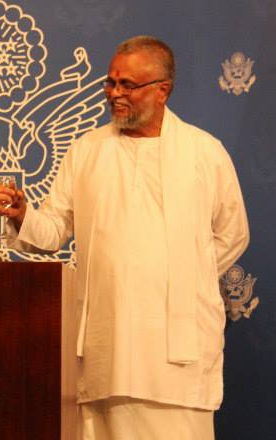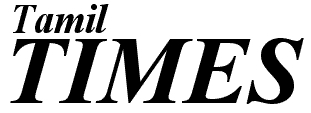Related Research Articles

The Liberation Tigers of Tamil Eelam was a Tamil militant organization that was based in northeastern Sri Lanka. The LTTE fought to create an independent Tamil state called Tamil Eelam in the north-east of the island, due to the continuous discrimination and violent persecution against Sri Lankan Tamils by the Sinhalese dominated Sri Lankan Government.

The Tamil people, also known as Tamilar, or simply Tamils, are a Dravidian ethno-linguistic group who trace their ancestry mainly to India’s southern state of Tamil Nadu, union territory of Puducherry and to Sri Lanka. Tamils who speak the Tamil Language and are born in Tamil clans are considered Tamilians. Tamils constitute 5.9% of the population in India, 15% in Sri Lanka, 7% in Malaysia, 6% in Mauritius, and 5% in Singapore.
Sirima Ratwatte Dias Bandaranaike, commonly known as Sirimavo Bandaranaike (මැතිනිය), was a Sri Lankan politician. She was the world's first female prime minister when she became Prime Minister of Sri Lanka in 1960. She chaired the Sri Lanka Freedom Party from 1960 to 1994 and served three terms as prime minister, two times as the chief executive, 1960 to 1965 and 1970 to 1977, and once again in a presidential system from 1994 to 2000, governing under the presidency of her daughter Chandrika Kumaratunga.

Mahinda Rajapaksa is a Sri Lankan politician. He served as the President of Sri Lanka from 2005 to 2015; the Prime Minister of Sri Lanka from 2004 to 2005, 2018, and 2019 to 2022; the Leader of the Opposition from 2002 to 2004 and 2018 to 2019, and the Minister of Finance from 2005 to 2015 and 2019 to 2021. He has been a Member of Parliament (MP) for Kurunegala since 2015.

Virakesari is one of the leading Tamil daily newspapers in Sri Lanka. It is the oldest and the largest circulated Tamil Newspaper in Sri Lanka. Virakesari is owned by Express Newspapers (Ceylon) (Private) Limited, a leading print and web media organization in Sri Lanka.

Mass media of Sri Lanka consist of several different types of communications media: television, radio, newspapers, magazines, and Web sites. State and private media operators provide services in the main languages Sinhala, Tamil and English. The government owns two major TV stations, radio networks operated by the Sri Lanka Broadcasting Corporation (SLBC), and newspaper titles in Sinhala, Tamil, and English.

Kathiravelu Nythiananda Devananda, commonly known as Douglas Devananda, is a Sri Lankan Tamil politician, Cabinet Minister and leader of the Eelam People's Democratic Party. Originally a Sri Lanka Tamil militant who fought against the Sri Lankan government for an independent Tamil Eelam, he became a pro-government paramilitary leader and politician. Due to his strong opposition to and vocal criticism of the rebel Liberation Tigers of Tamil Eelam, they unsuccessfully tried to assassinate him over 10 times. Devananda is a proclaimed offender in India and is wanted on charges of murder, attempt to murder, rioting, unlawful assembly and kidnapping. He was sworn in as Minister of Fisheries and Aquatic Resources on 22 November 2019.

Tamil Eelam is a proposed independent state that many Tamils in Sri Lanka and the Sri Lankan Tamil diaspora aspire to create in the north and east of Sri Lanka. The name is derived from the ancient Tamil name for Sri Lanka, Eelam. Tamil Eelam, although encompassing the traditional homelands of Sri Lankan Tamils, does not have official status or recognition by world states. Large sections of the North-East were under de facto control of the Liberation Tigers of Tamil Eelam (LTTE) for most of the 1990s–2000s during the Sri Lankan Civil War.
Nakkheeran Gopal is a veteran journalist from Tamil Nadu, India. He is the editor and publisher of Tamil political investigative journal Nakkheeran. He shot to national fame in the 1990s when he took interviews with Veerappan, who was surviving in the forests committing crimes on the Tamil Nadu – Karnataka border, hoodwinking the police of the two states.
Uthayan is a Tamil language Sri Lankan daily newspaper published by New Uthayan Publication (Private) Limited, part of the Uthayan Group of Newspapers. It was founded in 1985 and is published from Jaffna. Its sister newspapers is the Colombo based Sudar Oli. Uthayan was the only newspaper published from Jaffna which did not cease publication due to the civil war. The newspaper has been attacked several times, a number of its staff have been murdered by paramilitary groups and other forces, and it regularly receives threats.
Sudar Oli is a Tamil language Sri Lankan daily newspaper published by Mass Media Syndicate (Private) Limited, part of the Uthayan Group of Newspapers. It was founded in 2000 and is published from Colombo. Its sister newspaper is the Jaffna based Uthayan. The newspaper has been attacked several times, a number of its staff have been murdered by paramilitary groups and other forces, and it regularly receives threats.
The Sunday Leader was an English-language Sri Lankan weekly newspaper published by Leader Publications (Private) Limited. It was founded in 1994 and is published from Colombo. Its sister newspapers are the Iruresa (Irudina) and the defunct The Morning Leader. Founded by brothers Lasantha Wickrematunge and Lal Wickrematunge, the newspaper is known for its outspoken and controversial news coverage. The newspaper and its staff have been attacked and threatened several times and its founding editor Lasantha Wickrematunge was assassinated.

Lasantha Manilal Wickrematunge was a high-profile Sri Lankan journalist, politician, broadcaster and human rights activist who was assassinated in January 2009.
Between 2008 and 2009, major protests against the Sri Lankan Civil War took place in several countries around the world, urging national and world leaders and organisations to take action on bringing a unanimous cease fire to the Sri Lankan Civil War, which had taken place for twenty-six years. Tamil diaspora populations around the world expressed concerns regarding the conduct of the civil war in the island nation of Sri Lanka. The civil war, which took place between the Sri Lankan Army and the separatist group Liberation Tigers of Tamil Eelam is believed to have killed over 100,000 civilians. Protesters and critics of the Sri Lankan government that triggered a culturally based civil war to be a systematic genocide and ethnic cleansing of the Sri Lankan Tamil minority in Sri Lanka.

The history of Sri Lanka from 1948 to the present is marked by the independence of the country through to Dominion and becoming a Republic. The main factor has been conflict and civil war regarding the status of minority Tamils.
The Lessons Learnt and Reconciliation Commission was a commission of inquiry appointed by Sri Lankan President Mahinda Rajapaksa in May 2010 after the 26-year-long civil war in Sri Lanka to function as a Truth and reconciliation commission. The commission was mandated to investigate the facts and circumstances which led to the failure of the ceasefire agreement made operational on 27 February 2002, the lessons that should be learnt from those events and the institutional, administrative and legislative measures which need to be taken in order to prevent any recurrence of such concerns in the future, and to promote further national unity and reconciliation among all communities. After an 18-month inquiry, the commission submitted its report to the President on 15 November 2011. The report was made public on 16 December 2011, after being tabled in the parliament.
Freedom of the press in Sri Lanka is guaranteed by Article 14(1)(a) of the Constitution of Sri Lanka which gives every citizen "the freedom of speech and expression including publication". But under some government's there was widespread suppression of the media, particularly those critical of those governments. Sri Lanka is ranked 146 out of 180 countries in Reporters Without Borders's Press Freedom Index for 2022

Sirimal Wijesinghe is a Sri Lankan author, political analyst, film director, journalist, alternative intellectual, and leader of the Poor People's Party in Sri Lanka. critic and activist. He is the founding editor of the controversial Sinhala youth magazine, Paradisaya. He is one of the pioneers of the new wave of Colombo-based young political and cultural analysts who emerged in the decade of 1980, particularly after the advent of the open economic system. Wijesinghe's contribution in various fields, ranging from politics to arts, has been considered experimental as well as path-breaking.

The Tamil Times was an English language British monthly news magazine focusing on Sri Lankan Tamil issues. Founded in 1981, the magazine was published from Sutton and distributed worldwide to the Sri Lankan Tamil diaspora. It ceased publication in 2006.
References
- 1 2 3 Jeffrey, Robin (9 February 1997). "Tamil:'Dominated by Cinema and Politics'". Economic and Political Weekly. 32 (6): 254–256.
- 1 2 3 4 5 N. Sathiya Moorthy (25 November 1992). "Tamil Nadu's political tabloids". Independent. Mumbai. Retrieved 22 February 2012May also still be in Eenadu Files in Hyderabad
{{cite news}}: CS1 maint: postscript (link) - ↑ "Man Behind The Scoops". Outlook India. 24 April 1996. Retrieved 21 February 2012.
- ↑ "Summons to 14 accused in 'Tharasu' case". The Hindu . 20 February 2000. Archived from the original on 9 July 2012. Retrieved 18 February 2012.
- ↑ "BJP govt not to complicate Sri Lankan Tamil issue". The Sunday Times. Sri Lanka. 8 March 1998. Retrieved 21 February 2012.
- ↑ "Tamil Magazines". tamilelibrary.org. Retrieved 18 February 2012.